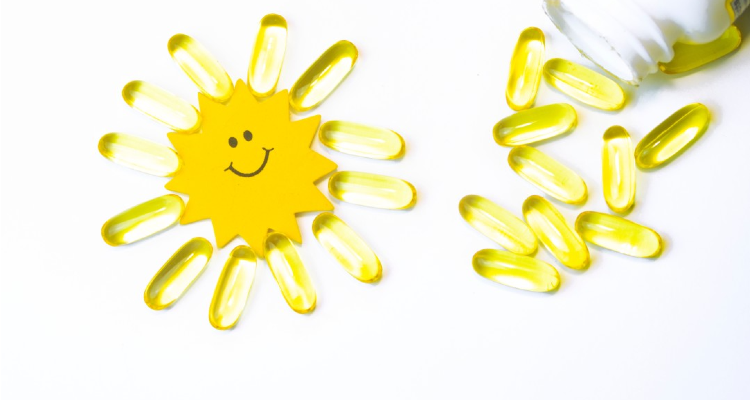Vitamin D, also known as the sunshine vitamin, is critical in many bodily functions and systems. Inadequate levels of this fat-soluble nutrients are rampant in North America and linked with multiple health challenges.
Ensuring that vitamin D levels are up to par can be tricky, as only trace amounts are available through diet by foods. The majority of people don't live in parts of the country where sufficient levels can be assimilated from sun exposure. If you live above the Mason Dixon line, there's a good chance that your vitamin D serum levels are low.*
Most doctors and health experts – in both the integrative and conventional medical communities– agree that vitamin D supplementation is often necessary. So, it’s essential to understand the best delivery method for optimal absorption.

Importance of Vitamin D
A little known fact about vitamin D, compared to other vitamins, is that it is a steroidal hormone that the body produces from sun exposure. Studies show that this vital nutrient plays vital roles in overall bone health, increased immune health, improved insulin response, mood support, and more.*[1][2]
Additionally, vitamin D is a necessary cofactor in several bodily functions, mainly revolving around inflammation within the immune response.* For this reason, vitamin D has been linked to immunological issues. Another issue commonly associated with low vitamin D serum levels is seasonal mood changes –when a person experiences low mood or occasional anxiousness during winter months.
Vitamin D Supplementation
Vitamin D isn't easy to obtain from food, and because of the UV rays' angle, those who live in northern regions of the country (roughly above Atlanta) find it challenging to process vitamin D throughout most of the year. Those with darker skin are more at risk for low vitamin D status, as their skin naturally protects from the sun, and greater exposure is needed.
Also necessary to keep in mind is that there are two types of vitamin D: vitamin D2 and vitamin D3. Vitamin D3 is considered to be the superior form when supplementing, as it is more active and easily absorbed.
Along with A, E, and K, vitamin D is fat-soluble, meaning it's dissolved and absorbed in the presence of fat and stored for long periods. With so many vitamin D products out there, it can be challenging to understand which supplement form and delivery methods are best for optimal absorption.
Liposomal delivery refers to packing nutrients into cell membranes that have a great deal of fat-solubility. This protects the nutrient as it passes through the harsh conditions of the gastrointestinal tract. Naturally, this translates to better preservation of the delivered nutrients and improved absorption.[3]
Most studies done on vitamin D supplementation do not includethe use ofliposomal delivery. So, even though it makes logical sense that vitamin D would do better with this delivery method and doctors have better results with it than with tablets, capsules or gummies, there are few clinical studies to back up this clinical observation.
By taking liposomal vitamin D, absorption is increased. The vitamin itself is protected against oxidation and degradation as it moves through the body, making it more bioavailable and more likely to provide optimal benefits.
Vitamin D Levels and Testing
It's disadvantageous to test soon after beginning vitamin D supplementation. Vitamin D is stored in fat cells, so seeing an increase in levels takes longer. For example, levels tested in July are more reflective of actual levels in March, and so on. In comparison, vitamin C is a water-soluble nutrient that goes immediately to the bloodstream, and the body will excrete any extra in the urine.
The most effective method of vitamin D supplementation entails a consistent dose all year round, instead of intermittent and large doses, unless explicitly prescribed by a professional as an individualized therapy.
Main Takeaways:
Vitamin D is complex, so keep in mind the following key takeaways from this article:
- Low vitamin D levels are widespread in the United States and worldwide. Those in regions north of Atlanta and those with darker skin are even more likely to struggle to achieve optimal serum levels.
- This fat-soluble nutrient plays a role in many areas of overall health, including bone and immune health.*
- The conventional and integrative medical communities agree that vitamin D supplementation is essential for much of the population. The best method is consistent doses throughout the year instead of intermittent doses in higher amounts.
- Liposomal delivery protects vitamin D from oxidation and degradation, making it more bioavailable and better absorbed by the body.
While experts disagree on optimal blood levels, numbers between 40-50 ng/ml are most likely best for optimal health and wellness.* Discuss supplementation dosage with your provider, choose a liposomal vitamin D product for best results, or for people who have trouble swallowing pills.
Vitamins A, D, and K work together synergistically. Find out more in our whitepaper.

[1] Hyppönen E, Läärä E, Reunanen A, Järvelin MR, Virtanen SM. Intake of vitamin D and risk of type 1 diabetes: a birth-cohort study. Lancet. 2001;358(9292):1500-1503. doi:10.1016/S0140-6736(01)06580-1
[2] https://www.ncbi.nlm.nih.gov/pmc/articles/PMC3356951/
[3] Akbarzadeh, A., Rezaei-Sadabady, R., Davaran, S. et al. Liposome: classification, preparation, and applications. Nanoscale Res Lett 8, 102 (2013). https://doi.org/10.1186/1556-276X-8-102


















